How to Contribute and Publish Guest Posts on Forbes (Updated)
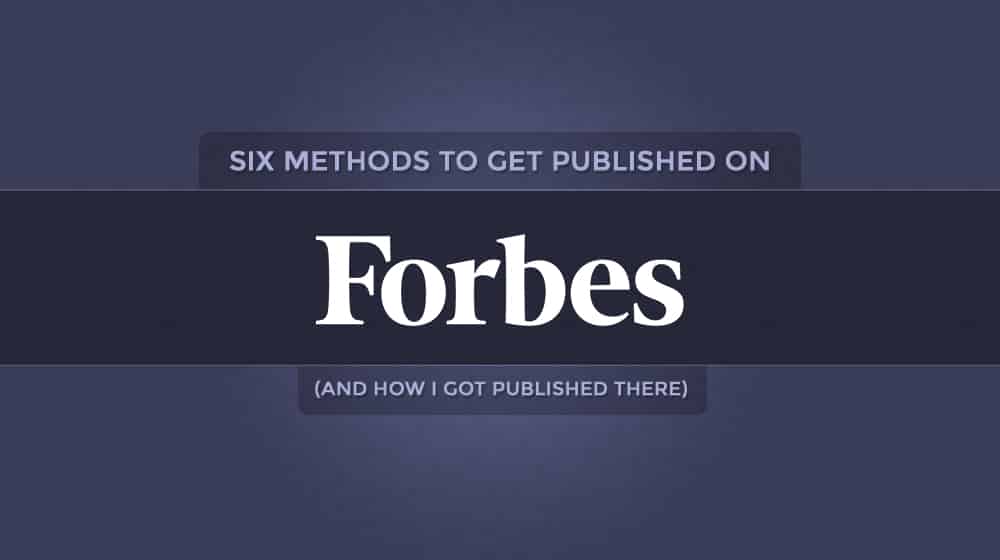
Forbes is a massive authority website. According to Moz, it's number 44 in terms of Domain Authority, which means it's one of the top 50 websites in the world in terms of SEO power behind it. Forbes has an Ahrefs rank of 106 at the time of writing, meaning it's close to being one of the top 100 most visited websites on the internet. It also has thousands of people contributing content to it across virtually every possible topic. Thus, it stands to reason that you may want to use it for your gain, right?
As someone who writes for Forbes, I can tell you how I did it, how others do it, and what guest posting opportunities you might have to try yourself. I'll also give you a fair warning, so read on to see what I've got to say.
Six Ways to Write for Forbes
The way I see it, there are six different ways you can get your content published on Forbes, with a link or unlinked mention that can help your website and business. The trouble is that only two are "legit," and only one is reasonable today.
So, let's start from the bottom up.
1. Contacting a Forbes Writer Directly
The first option is to reach out to someone who already writes for Forbes as a contributor (generally not any of the managing editors or higher-ups, though, for reasons I'll get to in a moment) and ask them if they'd be willing to write about you. You can ask them to cover you, pitch them an idea, or even offer to provide them with a fully-written, Forbes-quality blog post for them to publish.
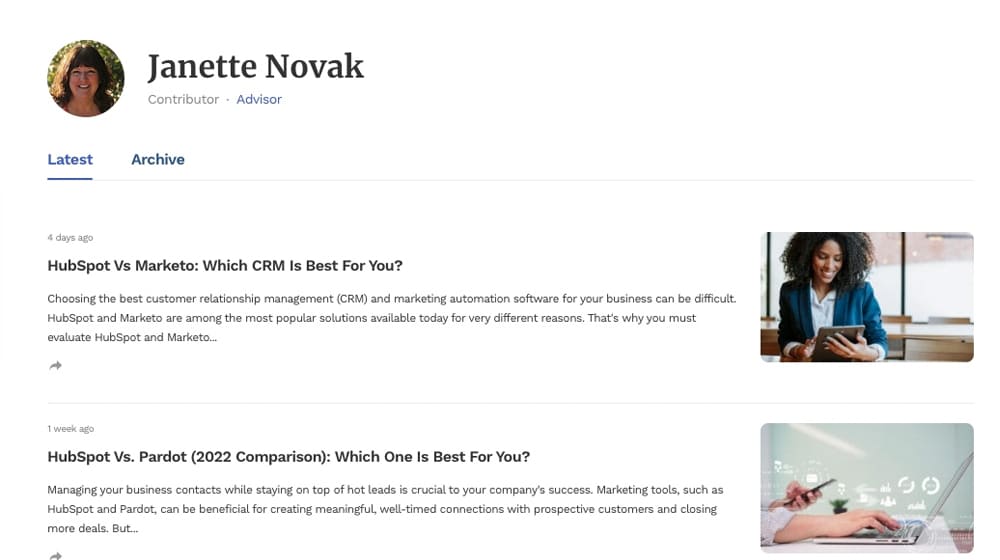
This tactic is relatively straightforward because the people who write for Forbes are generally prolific in other venues. You can probably find them on their websites, Twitter or LinkedIn, or PR sites. They're likely using Forbes to build their brands and be contributors and journalists, so it's likely that they even have a contact email published somewhere easy to find. For example, this guy has a profile on the side with his Forbes email account and his Twitter handle.
There are, however, a few drawbacks to this.
1.The first is that these writers, especially in some of the more high-traffic, high-demand, high-value industries (like marketing and tech), will be inundated with these kinds of outreach emails. They probably go through hundreds per week, if not more. They will likely ignore your email like the hundreds of other pitch emails they received that week. You'll need to have something compelling to stand out.
2. The second and more critical drawback is this section from Forbes' Editorial Values and Standards:
"We prohibit all staff members and contributors from accepting compensation, privileges or favors of any kind from people, companies or groups featured in their coverage. Any real or perceived conflicts of interest or relationships at all (financial, professional, legal actions, personal or otherwise) must be avoided and/or discussed with the appropriate managing editor. If approved, it must be explicitly disclosed in the story to readers to maintain their trust.
Any attempt or failure to honor these solemn responsibilities is a serious offense and is subject to review and swift disciplinary action, including removal from the platform."
In other words, if you approach a Forbes contributor asking them to cover you, and the guest writer does, this can cause them a significant problem, up to and including having their account closed and their content removed. Even if the content isn't removed, you'll often see a writer page that looks like this because they've been removed from the platform.
So, many writers won't accept pitches or ghostwriting, especially if it's promotional for you, because it risks their reputation and their career.
2. Hiring a Forbes Writing Service Online
The second option is the same as the first option, except laundered through a platform. Some writers (or writers' agents) will promote themselves for sale on influencer marketing marketplaces. They advertise themselves as writers for Forbes and allow you to buy their services by publishing an article on Forbes. You used to see these on Fiverr all the time, though these days, they're a little harder to locate.
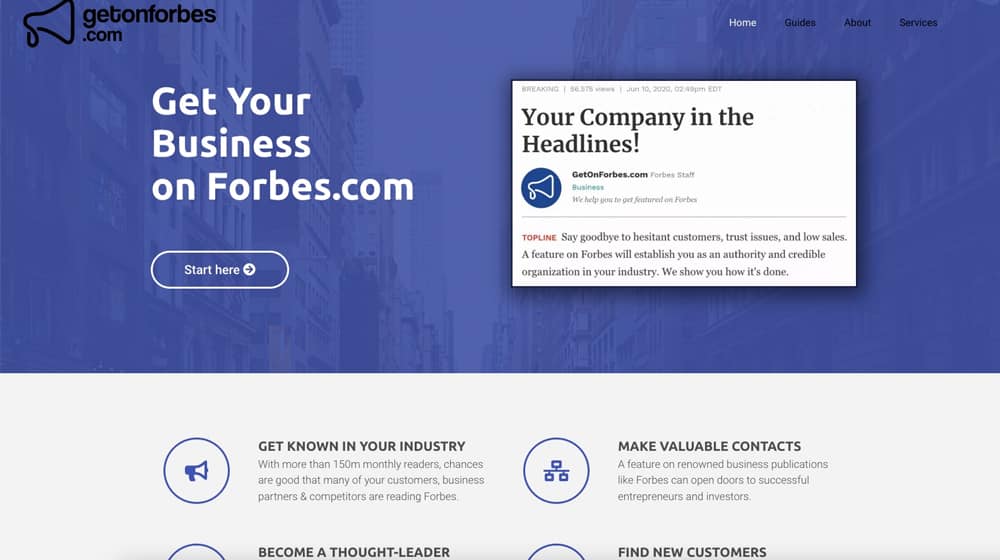
Some will allow you to write the article; others will ask for your topic and link and will write it themselves to ensure that it's in their style and coverage of a subject. It may or may not be done anonymously or semi-anonymously through a platform. Why? For the same reason as above, if Forbes learned a writer was selling their post slots, that writer would be removed immediately.
3. Reaching Out to Editors to Become a Contributor
If you can't reach out to writers and get them to accept your pitch or publish your content, why not become a writer yourself?
Unfortunately, this is also very difficult. Almost like Forbes wants to maintain a reputation for journalistic integrity and top-tier content, they don't accept content from any random person who comes along, right?
As you might expect, this all comes down to networking. Every inside tip and "how to get on Forbes" post I can find (and my personal experience) says the same thing - you need to be friends with an existing editor to get them to let you contribute to their section.
For some people, that means social connections. For others, it just means being a prominent enough, high-profile industry expert that the editor of your section will have heard of you before and will be willing to offer you a place. That's Josh Steimile's advice: be good at what you do, such that the Forbes editor knows who you are and offers you a job.
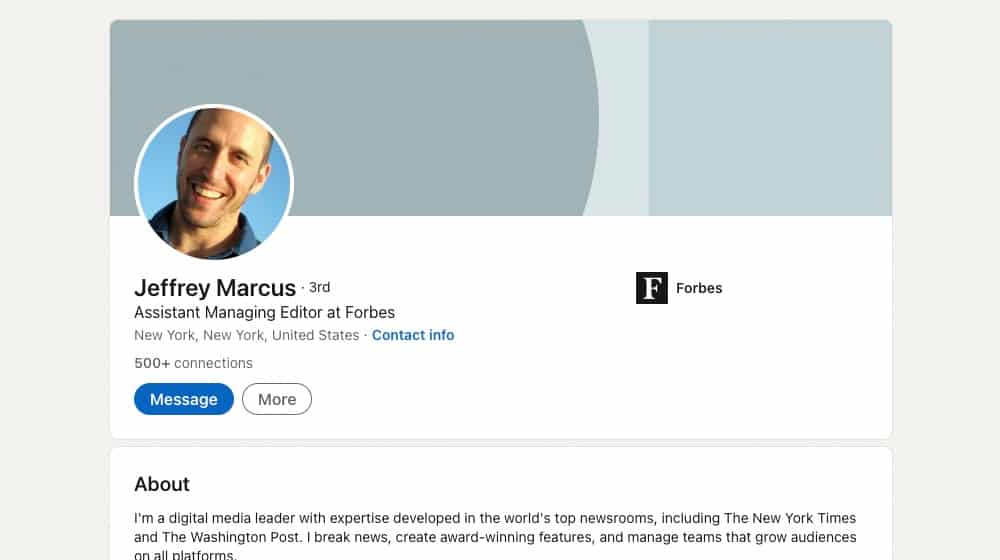
Not very helpful, right? Props to Josh for writing some evergreen content and even creating a paid course based on "just get lucky," though; good hustle.
Yeah, sadly, that's pretty much the way these things go. Forbes editors are flooded with people trying to network with them specifically to angle their way into a chance to contribute, so you have a lot of competition for minimal attention.
In my personal experience here, this is virtually impossible if you're not already a prominent guest blogger. Even though I had published content on other authority sites – including Entrepreneur, Inc, and Business Insider – I wasn't even given the time of day when I pitched myself to a few relevant section editors. Talking with editors takes dozens of follow up emails and icon clad persistence.
4. Pitching an Idea to Forbes Channels (Deprecated)
Another option you can try is to send general pitches to Forbes. They have one particular email address, ideas@forbes.com, that you can use to send pitches for your content ideas. Editors comb through the inbox, and if a piece of content is relevant to their section and the idea has merit, they may reply and invite you to write the content for their column.
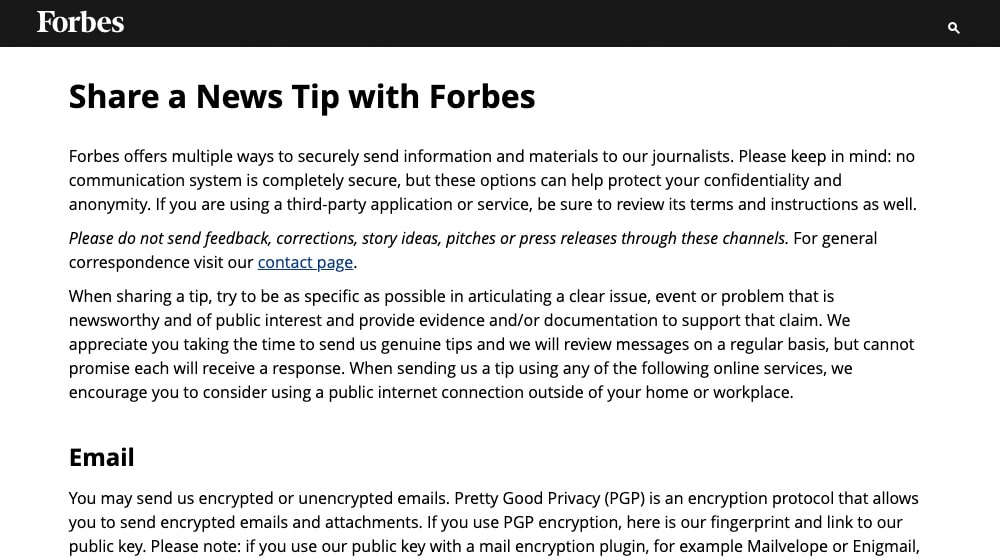
This strategy isn't very reliable, of course. Anyone who has ever had to manage a shared inbox knows how much of a mess it can be, and something the size of Forbes is bound to get thousands of pitches per day, most of which will be pretty poor. The chances of being seen are slim, but it's still an option. After all, it certainly won't hurt to play the lotto once or twice.
5. Becoming a Source for Forbes Writers
Another option you might be able to try is to become an expert source. Unfortunately, this option is based heavily on both timing and luck.
The key here is HARO, the Help A Reporter Out system. HARO is a platform where journalists covering a topic can ask for experts to interview, cite, or otherwise get quotes for use in their pieces. It's also a site where people like you and me can be those expert sources. You have to be able to write a good pitch, and you'll be competing with other experts in your niche, so you better be good.
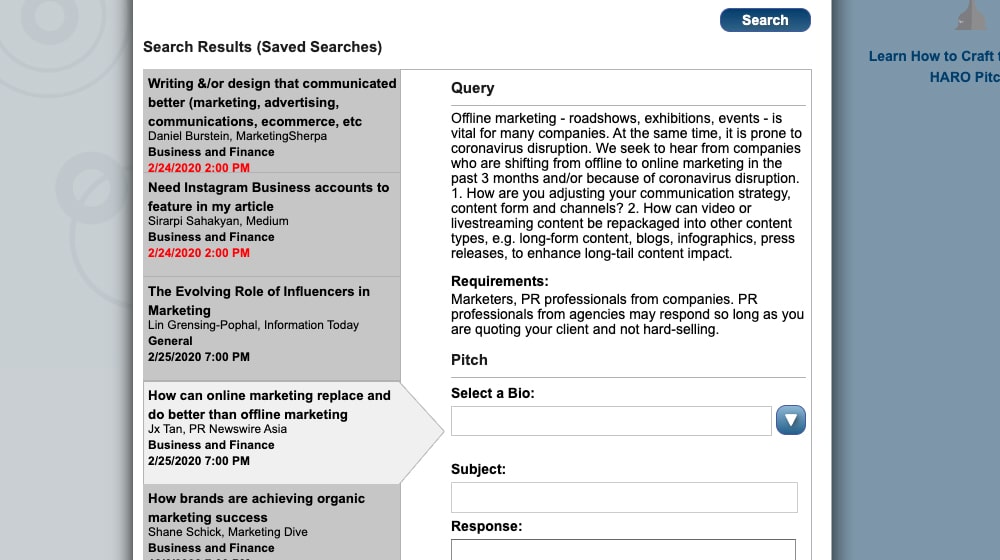
Luck and timing come into play here because Forbes writers don't consistently use HARO. Forbes writers usually have their pick of people to pull for quotes. They don't usually need platforms like HARO to get the hookup. But, you can find a relevant writer on the site now and then. Think about it; if a Forbes writer emailed you and asked for a quote for a post, would you turn them down?
Of course, HARO is excellent for other reasons, so you can get some outstanding citations even if you don't get on Forbes.
6. Using the Forbes Councils System
Sooner or later, it all comes down to this.
In 2016 (I'm unsure of the exact date; let me know if you know when it was), Forbes introduced the Councils system. Forbes Councils are essentially regional or topical authority groups. There are business councils, agency councils, HR councils, and more.

Members of a Council are given author accounts and can contribute to Forbes in the Councils sections. They can write and publish whatever they want, as long as it complies with the usual Forbes guidelines and style guides. So, what's the catch?
1. First, you need to meet the qualifications. If you're a senior executive, you must be part of a business that generates at least $1m in revenue or has $1m in financing. If you're a business owner or part of a non-profit, you need an annual income of $500k or at least three years of experience as a publicly recognized business leader or coach.
1. Second, and most important, it's pay to play. Depending on the council you're trying to get into, the fee can range anywhere from $1,200 to $2,000 in 2022, $2,500 - $5,000 in 2024, $2,700 to $6,000 in 2025 - and possibly more for some more in-demand councils. Moreover, that's not a one-time fee; that's an annual membership fee.
Now, sure, if your business makes a million or more every year, $2,700 per year is doable. Even still, it's a considerable fee for an annual recurring membership.
But, at least it's easier than trying to socially engineer your way into a position. Getting published on Forbes at that point is guaranteed, as long as you are a relevant fit for that council and you pay the membership fee.
Is Forbes Worth Pursuing in 2025?
At the start, I said I had a warning for you. That warning is this: Forbes isn't quite what it used to be.
Oh, don't get me wrong. A link from Forbes is still a link from a massively influential SEO giant, so there's no way it can hurt your site, and it will probably be significantly valuable. But that's for real Forbes posts.
On top of all this, Forbes Councils aren't shared on the Forbes Social Media channels and aren't promoted. They're exiled away on some back alley of the site and barely given the time of day. They're certainly no shortcut to industry stardom, that's for sure. The good thing about your articles is that they still appear in Google News and rank highly, so they'll get some traffic. I don't recommend publishing recent events or news content, though, since scheduling and publishing your guest blog post can take 1-2 months. When your article goes live, it won't be news anymore. My time-sensitive posts are usually denied for this reason.
On top of that, Forbes has been slowly diluting their brand over the years with less and less valuable content. Did you know they have people publishing video game guides? Or tips for Wordle, of all things? Does Forbes need daily guidance for a word game with its own column? Well, they have it. We get to hold that.
And last of all, if you're in any of these industries, you can forget about it since Forbes explcitly disallows executives associated with these types of companies from joining a Forbes Council:
- MLM/direct sales
- Gambling
- Adult entertainment
- Adult websites
- Adult products
- Cannabis companies
- Certain marketing agencies (e.g., link sellers or guaranteed media placements)
- Cryptocurrency companies associated with initial coin offerings (ICOs)
While Forbes is still an authority and an SEO powerhouse, they're far from the wealth-focused, illustrious publication they were when it started. These days, they're the same as any other sizeable multi-contributor publisher.
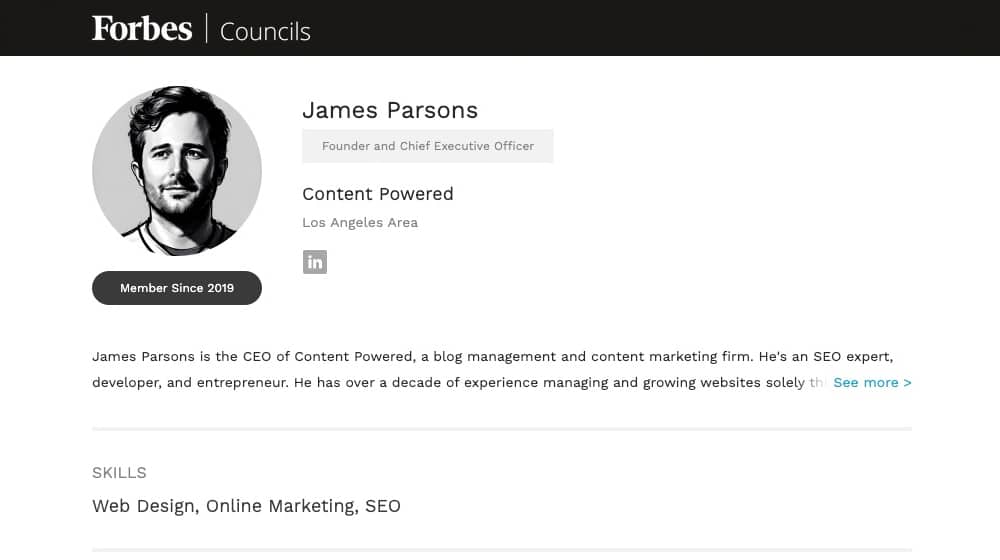
Now, having said all of that:
- Did I pay to become a member? Yes.
- Am I still a member in 2025? Yes.
- Have I been trying for years to write for Forbes unsuccessfully before finally caving in and becoming a member? Sure.
If you have an in, go for it, but if you have to fight (or pay) for a chance? It may not be worthwhile for you when there are dozens of other powerhouse sites with much lower barriers to entry.










January 31, 2023
Super helpful. I'd love to submit a post for publishing on Forbes. I'm going to put together a couple of topic/title ideas and see if they'll go for it.
February 03, 2023
Thanks for the comment, Patricia! Good luck, I hope you get through to someone. They're a tough nut to crack!
May 31, 2023
Amazingly interesting and useful read. Not even for once second i felt bored.
June 11, 2023
Thanks Mohit, what a great compliment!
August 08, 2023
James, you are very intelligent and this was an exciting and useful read. I want to share my thoughts on your Forbes account. Can you contact me?
August 16, 2023
Hi Sehrish, I appreciate your kind words!
Regarding a collaboration on my Forbes profile, it's against the terms of service on Forbes to do so. I would encourage you to go through the proper channels to become a writer there!
December 25, 2023
Helpful... I would like to submit a post for publishing in Forbes. I'm planning to put together a few topic/title ideas and see if they are interested.
December 27, 2023
Hey Abbas! Awesome, I wish you luck. If they don't go for it, you always have the Forbes Councils in your back pocket.